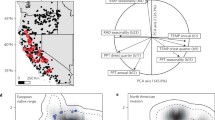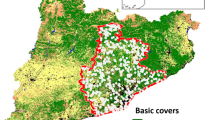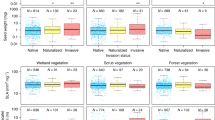Abstract
Because introduced species may strongly interact with native species and thus affect their fitness, it is important to examine how these interactions can cascade to have ecological and evolutionary consequences for whole communities. Here, we examine the interactions among introduced Rocky Mountain elk, Cervus canadensis nelsoni, a common native plant, Solidago velutina, and the diverse plant-associated community of arthropods. While introduced species are recognized as one of the biggest threats to native ecosystems, relatively few studies have investigated an evolutionary mechanism by which introduced species alter native communities. Here, we use a common garden design that addresses and supports two hypotheses. First, native S. velutina has rapidly evolved in the presence of introduced elk. We found that plants originating from sites with introduced elk flowered nearly 3 weeks before plants originating from sites without elk. Second, evolution of S. velutina results in a change to the plant-associated arthropod community. We found that plants originating from sites with introduced elk supported an arthropod community that had ~35 % fewer total individuals and a different species composition. Our results show that the impacts of introduced species can have both ecological and evolutionary consequences for strongly interacting species that subsequently cascade to affect a much larger community. Such evolutionary consequences are likely to be long-term and difficult to remediate.



Similar content being viewed by others
References
Agrawal AA, Hastings AP, Johnson MTJ, Maron JL, Salminen J-P (2012) Insect herbivores drive real-time ecological and evolutionary change in plant populations. Science 338:113–116. doi:10.1126/science.1225977
Anderson MJ (2001) A new method for non-parametric multivariate analysis of variance. Austral Ecol 26:32–46. doi:10.1111/j.1442-9993.2001.01070.pp.x
Bailey JK, Wooley SC, Lindroth RL, Whitham TG (2006) Importance of species interactions to community heritability: a genetic basis to trophic-level interactions. Ecol Lett 9:78–85. doi:10.1111/j.1461-0248.2005.00844.x
Bailey JK, Schweitzer JA, Rehill BJ, Irschick DJ, Whitham TG, Lindroth RL (2007) Rapid shifts in the chemical composition of aspen forests: an introduced herbivore as an agent of natural selection. Biol Invasions 9:715–722. doi:10.1007/s10530-006-9071-z
Barbour RC, Baker SC, O’Reilly-Wapstra JM, Harvest TM, Potts BM (2009) A footprint of tree genetics on the biota of the forest floor. Oikos 118:1917–1923. doi:10.1111/j.1600-0706.2009.17609.x
Bassar RD, Marshall MC, López-Sepulcre A, Zandoná E, Auer SK, Travis J, Pringle CM, Flecker AS, Thomas SA, Fraser DF, Reznick DN (2010) Local adaptation in Trinidadian guppies alters ecosystem processes. Proc Natl Acad Sci USA 107:3616–3621. doi:10.1073/pnas.0908023107
Bates D, Maechler M, Dai B (2008) lme4: Linear mixed-effects models using S4 classes. R package version 0.999375-28. http://lme4.r-forge.r-project.org/
Bolker BM, Brooks ME, Clark CJ, Geange SW, Poulsen JR, Stevens MHH, White J-SS (2008) Generalized linear mixed models: a practical guide for ecology and evolution. Trends Ecol Evol 24:127–135. doi:10.1016/j.tree.2008.10.008
Bolnick DI, Amarasekare P, Araújo MS, Bürger R, Levine JM, Novak M, Rudolf VHW, Schreiber SJ, Urban MC, Vasseur DA (2011) Why intraspecific variation matters in ecology. Trends Ecol Evol 26:183–192. doi:10.1016/j.tree.2011.01.009
Callaway RM, Ridenour WM, Laboski T, Weir T, Vivanco JM (2005) Natural selection for resistance to the allelopathic effects of invasive plants. J Ecol 93:576–583. doi:10.1111/j.1365-2745.2005.00994.x
Carmona D, Lajeunesse MJ, Johnson MTJ (2010) Plant traits that predict resistance to herbivores. Funct Ecol 25:358–367. doi:10.1111/j.1365-2435.2010.01794.x
Christian CE (2001) Consequences of a biological invasion reveal the importance of mutualism for plant communities. Nature 413:635–639. doi:10.1038/35098093
Coblentz BE (1978) The effects of feral goats (Capra hircus) on island ecosystems. Biol Conserv 13:279–286. doi:10.1016/0006-3207(78)90038-1
Collins WB, Urness PJ, Austin DD (1978) Elk diets and activities on different lodgepole pine habitat segments. J Wildl Manage 42:799–810
Craig TP, Itami JK, Horner JD (2007) Geographic variation in the evolution and coevolution of a tritrophic interaction. Evolution 61:1137–1152. doi:10.1111/j.1558-5646.2007.00099.x
Crutsinger GM, Collins MD, Fordyce JA, Gompert Z, Nice CC, Sanders NJ (2006) Plant genotypic diversity predicts community structure and governs an ecosystem process. Science 313:966–968. doi:10.1126/science.1128326
Dixon AFG (2003) Climate change and phenological asynchrony. Ecol Entomol 28:380–381
Edwards M, Richardson AJ (2004) Impact of climate change on marine pelagic phenology and trophic mismatch. Nature 430:881–884. doi:10.1038/nature02808
Ellison AM, Bank MS, Clinton BD, Colburn EA, Elliott K, Ford CR, Foster DR, Kloeppel BD, Knoepp JD, Lovett GM, Mohan J, Owrig DA, Rodenhouse NL, Sobczak WV, Stinson KA, Stone JK, Swan CM, Thompson J, Von Holle B, Webster JR (2005) Loss of foundation species: consequences for the structure and dynamics of forested ecosystems. Front Ecol Environ 3:479–486
Farkas TE, Mononen T, Comeault AA, Hanski I, Nosil P (2013) Evolution of camouflage drives rapid ecological change in an insect community. Curr Biol 23:1835–1843. doi:10.1016/j.cub.2013.07.067
Franks SJ, Weis AE (2008) A change in climate causes rapid evolution of multiple life-history traits and their interactions in an annual plant. J Evol Biol 21:1321–1334. doi:10.1111/j.1420-9101.2008.01566.x
Franks SJ, Sim S, Weis AE (2007) Rapid evolution of flowering time by an annual plant in response to a climate fluctuation. Proc Natl Acad Sci USA 104:1278–1282. doi:10.1073/pnas.0608379104
Franks SJ, Avise JC, Bradshaw WE, Conner JK, Etterson JR, Mazer SJ, Shaw RG, Weis AE (2008) The resurrection initiative: storing ancestral genotypes to capture evolution in action. Bioscience 58:870–873. doi:10.1641/B580913
Genung MA, Lessard JP, Brown CB, Bunn WA, Cregger MA, Reynolds WN, Felker-Quinn E, Stevenson ML, Hartley AS, Crutsinger GM, Schweitzer JA, Bailey JK (2010) Non-additive effects of genotypic diversity affect pollinator visitation. PLoS ONE 5:e8711. doi:10.1371/journal.pone.0008711
Genung MA, Bailey JK, Schweitzer JA (2012) Welcome to the neighborhood: interspecific genotype by genotype interactions in Solidago influence above- and belowground biomass and associated communities. Ecol Lett 15:65–73. doi:10.1111/j.1461-0248.2011.01710.x
Harmon LJ, Matthews B, Des Roches S, Chase JM, Shurin JB, Schluter D (2009) Evolutionary diversification in stickleback affects ecosystem functioning. Nature 458:1167–1170. doi:10.1038/nature07974
Heath JJ, Kessler A, Woebbe E, Cipollini D, Stireman JO III (2014) Exploring plant defense theory in tall goldenrod, Solidago altissima. New Phytol 202:1357–1370. doi:10.1111/nph.12755
Hendry AP, Lohmann LG, Conti E, Cracraft J, Crandall KA, Faith DP, Häuser C, Joly CA, Kogure K, Larigauderie A, Magallón Moritz C, Tillier S, Zardoya R, Prieur-Richard A-H, Walther BA, Yahara T, Donoghue MJ (2010) Evolutionary biology in biodiversity science, conservation, and policy: a call to action. Evolution 64:1517–1528. doi:10.1111/j.1558-5646.2010.00947.x
Jansson RK, Smilowitz Z (1985) Influence of potato plant phenology on the population dynamics of the green peach aphid, Myzus persicae (Homoptera: Aphidae). Environ Entomol 14:7–11. doi:10.1093/ee/14.1.7
Johnson MTJ, Agrawal AA (2005) Plant genotype and environment interact to shape a diverse arthropod community on evening primrose (Oenothera biennis). Ecology 86:874–885. doi:10.1890/04-1068
Johnson RH, Hull-Sanders HM, Meyer GA (2007) Comparison of foliar terpenes between native and invasive Solidago gigantean. Biochem Syst Ecol 35:821–830. doi:10.1016/j.bse.2007.06.005
Johnson MTJ, Vellend M, Stinchcombe JR (2009) Evolution in plant populations as a driver of ecological changes in arthropod communities. Philos Trans R Soc B 364:1593–1605. doi:10.1098/rstb.2008.0334
Keith AR, Bailey JK, Whitham TG (2010) A genetic basis to community repeatability and stability. Ecology 91:3398–3406. doi:10.1890/09-1236.1
Kudo G, Ida TY (2013) Early onset of spring increases the phenological mismatch between plants and pollinators. Ecology 94:2311–2320. doi:10.1890/12-2003.1
Kufeld RC (1973) Foods eaten by the rocky mountain elk. J Rangel Manage 26:106–113
Lankau R (2012) Coevolution between invasive and native plants driven by chemical competition and soil biota. Proc Natl Acad Sci USA 109:11240–11245. doi:10.1073/pnas.1201343109
Lau JA (2012a) Evolutionary indirect effects of biological invasions. Oecologia 170:171–181. doi:10.1007/s00442-012-2288-x
Lau JA (2012b) Evolutionary indirect effects: consequences of introduced plant and insect interactions. In: Ohgushi T, Schmitz O, Holt RD (eds) Trait-mediated indirect interactions: ecological and evolutionary perspectives. Cambridge University Press, Cambridge
Laughlin DC, Abella SR (2007) Abiotic and biotic factors explain independent gradients of plant community composition in ponderosa pine forests. Ecol Model 205:231–240. doi:10.1016/j.ecolmodel.2007.02.018
Leopold A (1995) Restocking national forests with elk: where and how it may be done. In: Carmony NB, Brown DE (eds) Aldo Leopold’s Southwest. University of New Mexico Press, Albuquerque, pp 37–41
Lindroth RL, St. Clair SB (2013) Adaptations of quaking aspen (Populus tremuloides Michx.) for defense against herbivores. For Ecol Manage 299:14–21. doi:10.1016/j.foreco.2012.11.018
Loft ER, Kie JG (1988) Comparison of pellet-group and radio triangulation methods for assessing deer habitat use. J Wildl Manage 52:524–527
Maddox GD, Root RB (1987) Resistance to 16 diverse species of herbivorous insects within a population of goldenrod, Solidago altissima: genetic variation and heritability. Oecologia 72:8–14
McCall AC, Fordyce JA (2010) Can optimal defence theory be used to predict the distribution of plan chemical defenses? J Ecol 98:985–992. doi:10.1111/j.1365-2745.2010.01693.x
McCune B, Grace JB (2002) Analysis of ecological communities, 1st edn. MjM Software Design, Gleneden Beach
McNeilly T, Antonovics J (1968) Evolution in closely adjacent plant populations. IV. Barriers to gene flow. Heredity 23:205–218
Mooney KA, Agrawal AA (2008) Plant genotype shapes ant-aphid interactions: implications for community structure and indirect plant defense. Am Nat 171(6):E195–E205. doi:10.1086/587758
Mooney HA, Cleland EE (2001) The evolutionary impact of invasive species. Proc Natl Acad Sci USA 98:5446–5451. doi:10.1073/pnas.091093398
Oksanen, JF, Blanchet G, Kindt R, Legendre P, Minchin PR, O’Hara RB, Simpson GL, Solymos P, Henry M, Stevens H, Wagner H (2008) Vegan: community ecology package. R package version 1.15–1. http://cran.r-project.org/, http://vegan.r-forge.r-project.org/
Oliver I, Beattie AJ (1996) Invertebrate morphospecies as surrogates for species: a case study. Conserv Biol 10:99–109
Palkovacs EP, Post DM (2009) Experimental evidence that phenotypic divergence in predators drives community divergence in prey. Ecology 90:300–305. doi:10.1890/08-1673.1
Palkovacs EP, Marshall MC, Lamphere BA, Lynch BR, Weese DJ, Fraser DF, Reznick DN, Pringle CM, Kinnison MT (2009) Experimental evaluation of evolution and coevolution as agents of ecosystem change in Trinidadian streams. Philos Trans R Soc B 364:1617–1628. doi:10.1111/j.0014-3820.2002.tb00132.x
Pilson D (2000) Herbivory and natural selection on flowering phenology in wild sunflower, Helianthus anuus. Oecologia 122:72–82. doi:10.1007/PL00008838
R Development Core Team (2008) R: a language and environment for statistical computing. R Foundation for Statistical Computing, Vienna
Reznick DA, Bryga H, Endler JA (1990) Experimentally induced life-history evolution in a natural population. Nature 346:357–359
Reznick DN, Butler MJ IV, Rodd FH, Ross P (1996) Life-history evolution in guppies (Poecilia reticulata). 6. Differential mortality as a mechanism for natural selection. Evolution 50:1651–1660. doi:10.2307/2410901
Rosenstock SS, Ballard WB, Devos JC Jr (1999) Viewpoint: benefits and impacts of wildlife water developments. J Rangel Manage 52:302–3111
Sanders NJ, Gotelli NJ, Heller NE, Gordon DM (2003) Community disassembly by an invasive species. Proc Natl Acad Sci USA 100:2474–2477. doi:10.1073/pnas.0437913100
Smith DS (2012) Ph.D. dissertation, Biology Department. Cline Library, Northern Arizona University
Smith DS, Bailey JK, Shuster SM, Whitham TG (2011) A geographic mosaic of trophic interactions and selection: trees, aphids and birds. J Evol Biol 24:422–429. doi:10.1111/j.1420-9101.2010.02178.x
Smith DS, Lamit LJ, Lau MK, Gehring CA, Shuster SM, Whitham TG (2015) Introduced elk alter traits of a native plant and its plant-associated arthropod community. Acta Oecol 67:8–16. doi:10.1016/j.actao.2015.05.005
Strauss SY, Lau JA, Carroll SP (2006) Evolutionary responses of natives to introduced species: what do introductions tell us about natural communities? Ecol Lett 9:357–374. doi:10.1111/j.1461-0248.2005.00874.x
Thompson JN (1998) Rapid evolution as an ecological process. Trends Ecol Evol 13:329–332. doi:10.1016/S0169-5347(98)01378-0
Truett J (1996) Bison and elk in the American Southwest: in search of the pristine. Environ Manage 20:195–206. doi:10.1007/BF01204004
van Kleunen M, Ramponi G, Schmid B (2004) Effects of herbivory simulated by clipping and jasmonic acid on Solidago canadensis. Basic Appl Ecol 5:173–181. doi:10.1078/1439-1791-00225
Vazquez DP (2002) Multiple effects of introduced mammalian herbivores in a temperate forest. Biol Invasions 4:175–191. doi:10.1023/A:1020522923905
Vourc’h G, Martin J-L, Duncan P, Escarré J (2001) Defensive adaptations of Thuja plicata to ungulate browsing: a comparative study between mainland and island populations. Oecologia 126:84–93. doi:10.1007/s004420000491
Wallace MC, Krausman PR (1997) Movements and home-ranges of elk in Eastern Arizona. Proceedings Deer/Elk Workshop, Arizona
Weis AE (1996) Variable selection on Eurosta’s gall size. III. Can an evolutionary response to selection be detected? J Evol Biol 9:623–640
Weis AE, Hollenbach HG, Abrahamson WG (1987) Genetic and maternal effects on seedling characters of Solidago altissima (Compositae). Am J Bot 74:1476–1486
Whitham TG, Gehring CA, Lamit LJ, Wojtowicz T, Evans LM, Keith AR, Smith DS (2012) Community specificity: life and afterlife effects of genes. Trends Plant Sci 17:271–281. doi:10.1016/j.tplants.2012.01.005
Acknowledgments
We thank B. Blake and P. Patterson at the Northern Arizona University research greenhouse, and the Nature Conservancy, especially Neil Chapman, for their assistance in establishing the common garden. Special thanks to D. and L. Monroy Solance. Comments by K. Whitney, A. McCall and two anonymous reviewers greatly improved the manuscript. The experiments comply with the current laws of the USA in which the experiments were performed. Funding was provided by National Science Foundation FIBR grant (DEB-0425908) and a National Science Foundation IGERT to D. S. S.
Conflict of interest
The authors have no conflict of interest.
Author information
Authors and Affiliations
Corresponding author
Additional information
Communicated by Jennifer A. Lau.
Rights and permissions
About this article
Cite this article
Smith, D.S., Lau, M.K., Jacobs, R. et al. Rapid plant evolution in the presence of an introduced species alters community composition. Oecologia 179, 563–572 (2015). https://doi.org/10.1007/s00442-015-3362-y
Received:
Accepted:
Published:
Issue Date:
DOI: https://doi.org/10.1007/s00442-015-3362-y




